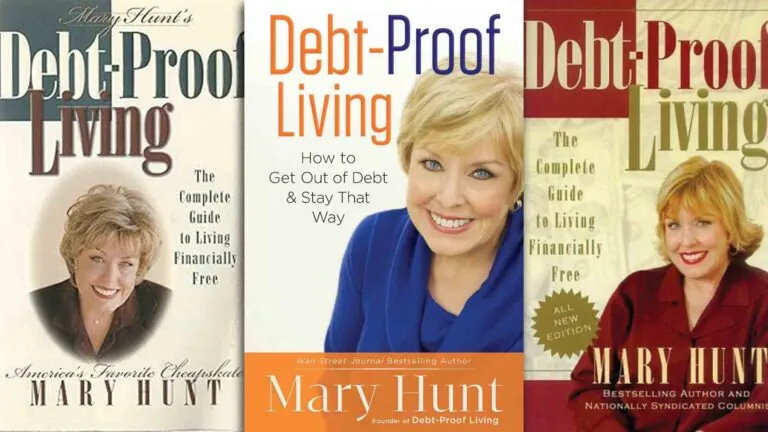The complete guide to living financially free
by Mary Hunt
2014 / 311 pages
As a regular reader of financial planning literature, and a fan of syndicated talk show hosts Clark Howard and Dave Ramsey, I was immediately drawn to this title when I found it in a used bookstore. I was even more interested when I flipped through the chapters and discovered that the author was a Christian, and that one of her first tools for getting out of debt was to give more to the Lord!
Hmmm, I had to read more!
North American society today is incredibly wealthy – even with the recent recession and long drawn-out recovery, we enjoy a standard of living that is far beyond what most of mankind has experienced for most of history. Despite our material riches, and our access to inexpensive food and amenities, many of us struggle to stay out of debt, and find ourselves living paycheck to paycheck.
Author Mary Hunt found herself in this situation some years ago: in a desire to keep up with the Joneses, she and her family regularly outspent their income. As a result, they became mired in over $100,000 of what she now calls “stupid debt” – debt that financed their lifestyle, not their essentials.
It took them years of dedicated effort, but the Hunts were able to budget and save their way out of debt. Along the way Mrs. Hunt discovered that many of her friends and acquaintances were in similar difficulties, and benefited from her teaching. Since that time she has written a series of books and newsletters helping people better manage their money.
Tithe is vital
One of the first principles the author highlights is that all of our finances belong to our Creator, and that it is our responsibility to be stewardly with what He has given us. An important way we can show this is by giving the tithe: dedicating our first fruits to Him. Even for those deepest in debt, she insists that giving the tithe (or for non Christians, giving to causes important to them) is the first step to properly managing our money. She rightly makes the point that going deeply in debt to finance one’s lifestyle is an incredibly selfish way to live, and cannot be pleasing to God. The tithe recognizes that all of life belongs to the Lord.
There are many keen insights in this book, and, even as a long time budgeter, I found Mrs. Hunt’s prescribed methods very helpful. One example: how often have you started a budget with good intentions, and stuck with it for a period of weeks, or maybe months, and then had your carefully tracked categories thrown off when the transmission blew in the family van. The author recommends what she calls a “Freedom Fund” – a monthly savings plan that recognizes that what we might call an unusual incident can usually be planned for, because these “emergencies” regularly happen, and therefore really should be part of our budgeting plans. A simple concept, but it is explained so clearly and thoroughly, and worked with in such a systematic way that anyone who follows the plan, will greatly increase the likelihood that they will stick with it!
Cash vs. credit
Mrs. Hunt is also not a fan of credit cards: her contention is that most people (yes, most!) spend far more when they use credit than when they are restricted by the amount of cash in their wallet (or in their budgeting envelopes!). Even people who consider themselves careful spenders will make more buying decisions in a given month when they use credit instead of cash.
Mrs. Hunt also tackles the issue of credit scores, and how one can manage one’s credit in a responsible way that will lead to a better credit score, which in turn can help one to qualify for a lower mortgage or car loan rate. As I read this chapter, I recalled that other Christian financial counselors advise that you not worry about your credit score: obsessing with it can lead you to make decisions – like opening additional lines of credit or taking out loans – that might improve your score but which may actually hurt your fight to stay out of debt! (See the work of Christian author Dave Ramsey for more on this point).
Other topics include warnings about debt consolidation loans, tips on how to finance your home, and an encouragement to look carefully at disability insurance as a responsible tool to provide for your family in case of injury that prevents you from being able to work. Lastly, the author looks at how to invest the money that you’ve saved in a stewardly way.
I heartily recommend this book for anyone interested in money management for Christians: even veteran planners will find much good material to work wit












